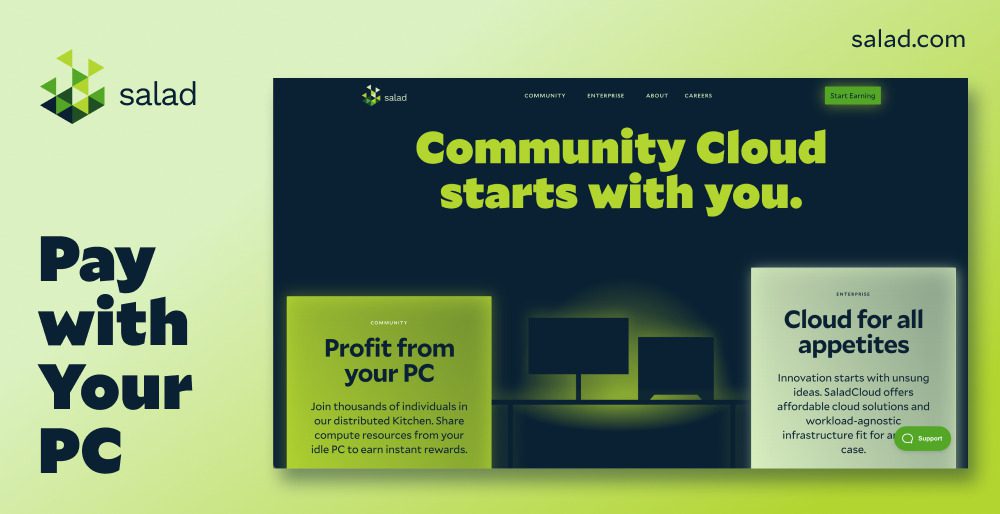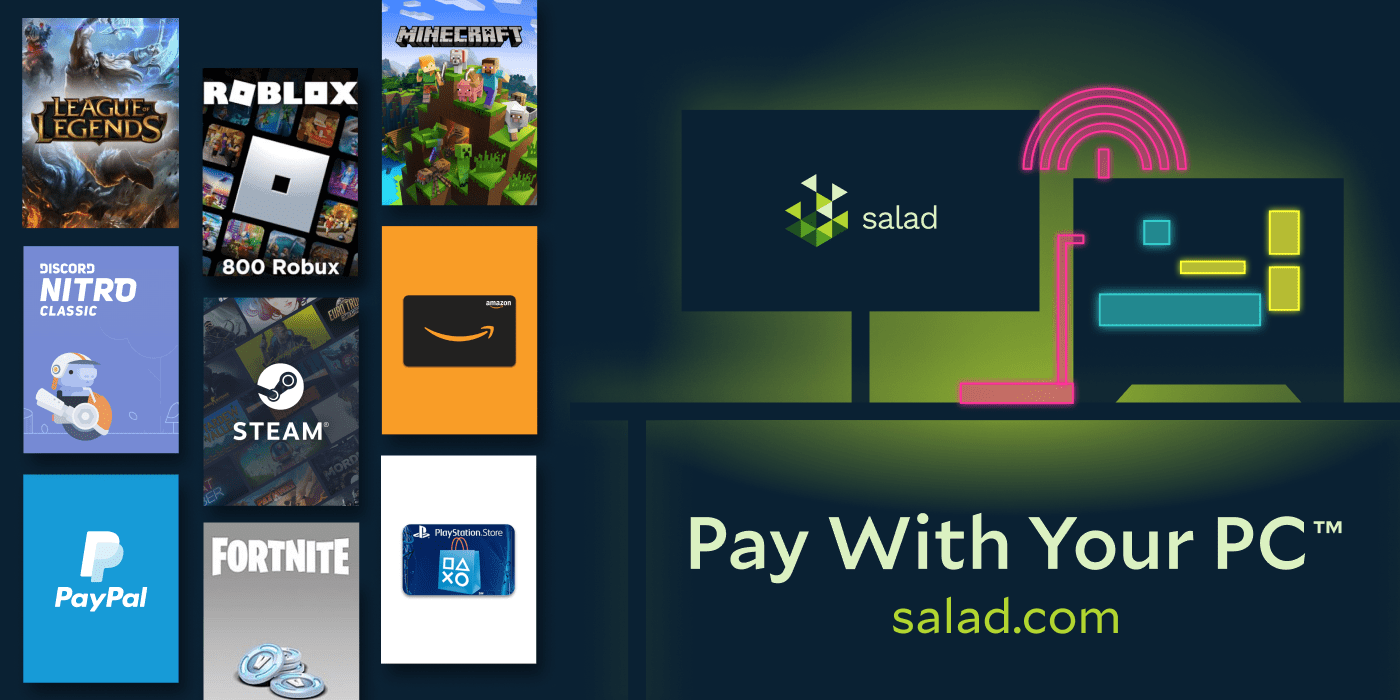[ad_1]
With centralized big data giants like AWS involved in a supposedly decentralized movement, the Web3 innovation will not reach its potential. Hence, web3 innovator Salad Technologies aims to eliminate Big Tech from the conversation by tapping 400 million idle gaming PCs to continue building the largest, decentralized cloud network. Salad Founder and CEO Bob Miles will be telling us more in this interview with TechBullion.
Please tell us a little more about yourself?
 Bob Miles, Founder & CEO of Salad Technologies.
Bob Miles, Founder & CEO of Salad Technologies.
Bob is the Founder and CEO of Salad Technologies. After training to become a pilot, Bob studied aeronautical engineering and began his career at Qantas Airways as a performance engineer. Soon after, Bob co-founded the digital production company responsible for The Green Way Up, a twelve-part television series that aired internationally on National Geographic and Netflix, in which he designed, built, and operated a custom waste-to-fuel vehicle on a cross-continent expedition—without consuming fossil fuels. Bob went on to specialize in product management for mobile applications, and then launched a connected car startup that developed networked software for consumer automobiles. He later relocated to the United States to take a position as Head of Product at a consumer drone manufacturer, where his passion for aviation coalesced with his expertise in building networked applications.
What is Salad and what unique services do you provide?
Salad is a cloud computing platform powered by hundreds of thousands of powerful gaming PCs distributed across 180+ countries. The future of the cloud is distributed and decentralized! Salad’s unique incentive model unlocks a future of widespread and workload-agnostic computesharing, where SaladCloud can provide GPU-enabled spot instances 4x more affordably than the “big three” cloud providers.

What inspired the Web3 and big data innovation by Salad, any success stories to share with us?
The average American now spends more than seven hours looking at a screen each day. That fact translates to exponential demand for storage, bandwidth, and compute cycles. Even with multimillion-dollar data centers cropping up around the world, centralized supply simply cannot keep up with demand. Unless we fundamentally change the way we compute, we’re headed for a compute crisis where our ability to connect could be limited by an empty tank. Thankfully the solution is sitting right in front of us. Today, over half of the world’s collective computational resources sit idle within consumer homes, connected to the Internet and equal to the task. Salad solves the so-called “human problem” of distributed computing by motivating everyday webizens to share their latent compute with trusted third parties. We envision a future where our relationship with the web changes for the better, and where millions of individuals can voluntarily power Web3, derive value from their home hardware, and restore the P2P foundations of the Internet. Within our first four years of operation, Salad users have shared more than 8,000 years of processing cycles to Ethereum and other blockchain ecosystems. The Salad desktop application has been downloaded to more than 1 million machines, and our network has attained peak processing rates that outpace some of the world’s fastest supercomputers. We’ve already supported dozens of Web3 protocols, and we will continue to do so in the years to come. Having recently contracted well-known enterprise clients for SaladCloud’s new bandwidth-sharing service, our engineers are presently exploring a radical new gaming platform with a Fortune 500 technology company.
Salad envisions a decentralized, distributed cloud that no data center could match, how do you aim to achieve this?
The majority of the world’s computational resources sit idle in consumer homes throughout the globe. These resources are overwhelmingly underutilized. With the right incentives, third parties could make use of those resources in a way that benefits the sovereign owners of that home hardware—something we like to call “computesharing.” Distributed computing traditionally suffers a “human problem.” How do you motivate, incentivize, and retain millions of individuals to share their excess resources? Much like the sharing economy concepts pioneered by AirBnB and Uber in the 2000s, the radical value proposition we’ve brought to market can only penetrate the mainstream through consumer education and advocacy. That’s why we’ve spent four years developing a sustainable user base within the gaming community. Our software is open source, fully opt-in, and now vetted by tens of thousands of daily active users. By frictionlessly converting latent consumer resources into meaningful rewards that resonate with their passions, we’ve simplified a radical value proposition like “share your idle PC” into “turn your idle compute into a monthly Netflix subscription, or a game.” Salad offers something for everyone, whether it’s extra PayPal balance, in-game content, or all kinds of digital purchases.
Tell us more about centralized big data and decentralized cloud networks, what is the difference and how does it work?
Today’s Internet belongs to a handful of mega corporations. Together, these “middlemen of the web” manipulate our online interactions, control the flow of information, and make products of their users’ most sensitive data. Nowadays we don’t own our private information; platforms do. And since the bulk of the web is powered by data centers owned and operated by tech giants, centralization forms a single point of failure in the schema of the Internet itself. As our lives become more entwined with the web, and more industries come to rely on constant connectivity, all it would take is one sustained outage in critical architecture to experience catastrophic failure. That’s the risk Web3 seeks to mitigate. Decentralized cloud networks like Salad can address many of these symptomatic ills, by restoring individual sovereignty, building more equitable systems, and distributing compute across millions of nodes that are not susceptible to localized failures. We’re in the early stages of a renewed peer-to-peer web. At Salad, we aim to forge the easiest and most trusted way to share compute resources, so that everyday people can help to power these emerging technologies.
Salad experienced a 10X growth in 2021, what is your growth strategy for 2022 and beyond?
The key to rapid growth is enriching SaladCloud’s client roster. By onboarding dozens more B2B customers to our affordable, massively-elastic cloud computing platform, we can offer our users an ever-expanding selection of compute tasks to support, and help them derive even greater value from their home hardware. Later this year, we will offer Salad users the chance to share bandwidth to support video streaming for several popular VPN services. The workload-agnostic infrastructure we’re building today will permit us to support virtually any computational task, whether it’s crunching data from IoT devices at the ephemeral edge, or powering intensive simulations, rendering jobs, and AI research. SaladCloud’s affordable, decentralized infrastructure will make it the ideal compute solution for emerging Web3 protocols. Shifting focus to the enterprise demand side of the computesharing marketplace will position us to solve real pain points for dozens of cloud computing customers who are resource- or budget-constrained.
Tell us more about Salad’s loot-for-compute model and how it has helped create a passive income stream for Salad Chefs?
Salad makes computesharing easy and rewarding. Our software is designed to be simple, intuitive, and as frictionless as possible. With one click, Salad Chefs earn value that can be redeemed for whichever digital rewards are most personally meaningful. By stocking Salad’s in-app storefront with something for everybody, we’re showing average people how accessing the hidden value of their home hardware can benefit their everyday lives. That recipe has helped us reach critical mass in terms of machines online, and given us the runway to extend Salad’s utility to a broader market. There are more than 300 million powerful gaming PCs in the world; we have barely scratched the surface of our addressable supply. When it comes to distributed applications, the unit economics for gaming PCs are particularly interesting. A home computer with a powerful or high-end GPU is capable of generating $50-100 per month just by supporting Web3 networks. To obtain the equivalent processing power from one of the incumbent cloud providers would cost over $1,000 per month. That delta illustrates the untold value we can deliver to our Salad Chefs community. Why pay a big corporation ten times what you could pay a voluntary individual?

How does Salad’s model actually allow “Chefs” to choose what their compute power goes toward?
Once a Salad user has downloaded our open-source application to their home computer, they’ll get the chance to configure exactly what kinds of machine resources they would like to share. The setup process allows them to determine how much monthly bandwidth or how many gigabytes of storage they’d like to share, and when their PC will share CPU or GPU compute cycles to our network. When users click “Start,” Salad detects the specifications of its host hardware, and defers to the user’s desired configuration when selecting the most profitable compute workload available. As we add diversified compute workloads through SaladCloud, we’ll introduce new UI dashboards from which our users will exercise complete control over what runs on their machine. It’s analogous to a testing menu at a restaurant: many folks will take the chef’s recommendation (i.e., the most profitable workload), but they can always opt for something else from the menu. Our Chefs will always get to control their setup and opt into or out of specific kinds of workloads. It should also be noted that any Salad workload must pass a rigorous internal review process; we’d never approve something nefarious for distribution across the Salad network. In four years of operation, no one’s computer has ever suffered an intrusion while running Salad’s baseline blockchain workloads.
Any available opportunities for investors and partners you would like to share with us from Salad?
Salad is now one of the world’s largest providers of GPU infrastructure. Our proprietary orchestration engine can distribute containerized applications across 10 to 10,000 GPUs, and our network services are several times more affordable than comparable cloud spot instances. We’re ready to onboard customers from nearly any market, especially those who are resource- or cost-constrained, such as data scientists, AI researchers, simulation engineers—or even larger companies who find their cloud computing bills unpalatable.
What is next on your roadmap at Salad, do you have more information for our readers today?
We’re currently working with a Fortune 500 technology company to bootstrap a new cloud gaming platform, and we’ve begun integrating several popular VPN services into our bandwidth-sharing vertical. As we continue to develop Salad’s menu of computational cuisine, we’re confident that our network will grow into one of the world’s largest cloud computing resources, and extend its services to address data scarcity in fields such as data science, artificial intelligence, and other innovative technologies.

[ad_2]
Source link






More Stories
Computer Knowledge (Literacy)
5 Ways to Use Articles in Internet Network Marketing
Learn to Be a Successful Network Marketer on the Internet